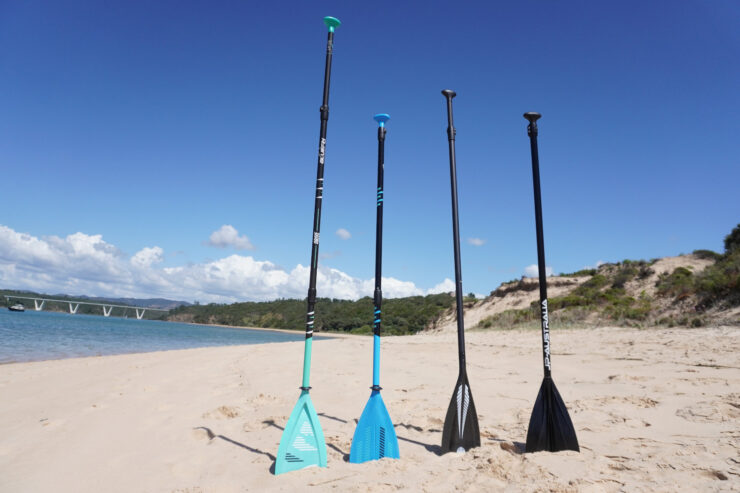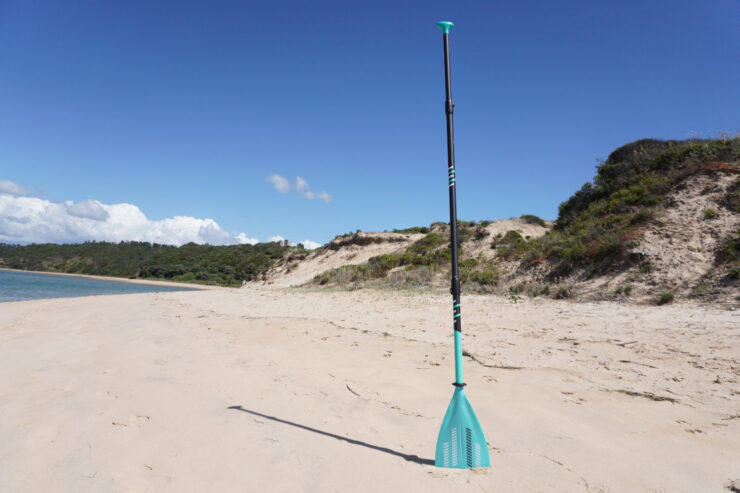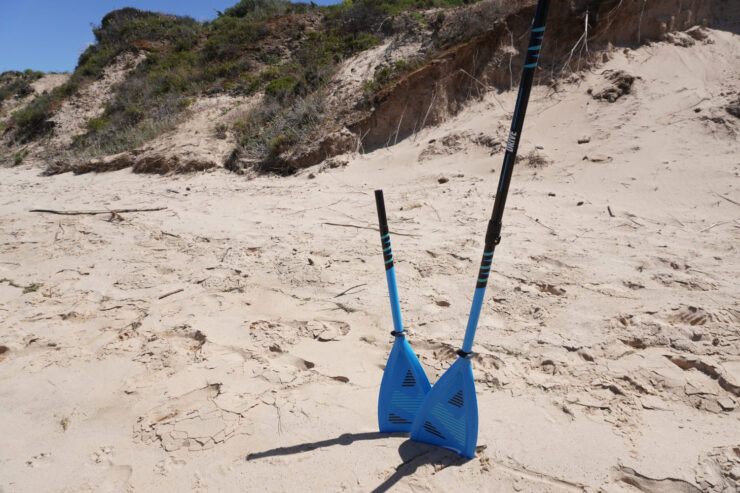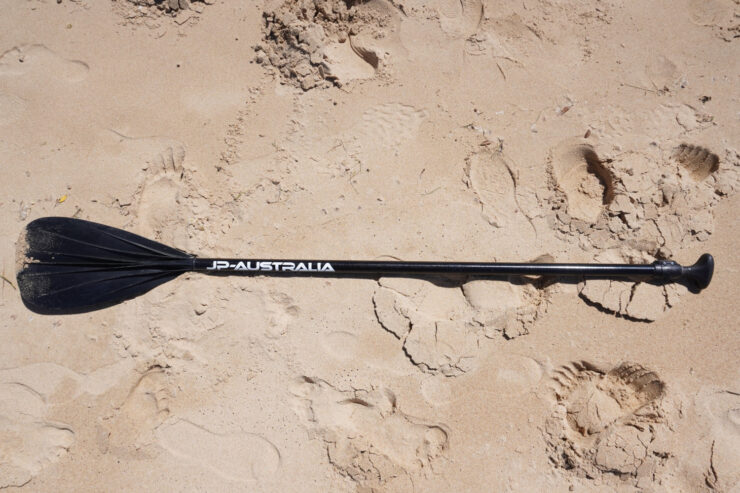The trend sport SUP is enjoying huge popularity worldwide and more and more people want to try stand-up paddling. At the latest when you buy your first SUP board, one question arises:
Which SUP paddle is the right one?
SUP paddles are now available in a wide variety of designs – this large selection can quickly become overwhelming.
What many people don’t know:
BeyondSurfing shows you what is important when buying a SUP paddle for your SUP or iSUP and how to find the right model. Avoid buying mistakes!
The best SUP paddles 2024?
Content
In a hurry? Our favorite SUP paddle:
- Ultra-light material
- Length infinitely adjustable
- Paddle bag included
SUP Paddle Checklist
- Size: Larger paddle blades require more force, whereas smaller paddle blades move more slowly.
- Models: SUP paddles are specially optimized for stand-up paddling and therefore differ from paddles for rowing boats or the double sided paddle board paddle for kayaks
- Characteristic: SUP paddles differ greatly in terms of material, handling characteristics, quality and price
Also interesting: The most popular inflatable SUP boards 2024.
These are the top 5 SUP paddles in 2024
1. NEMAXX Professional Carbon SUP Paddle
Advantages
- Ultra-light material
- Length infinitely adjustable
- Paddle bag included
Disadvantages
- Price
Summary
The high-quality carbon SUP paddle from Nemaxx is a good choice for all demanding long-distance, all-round or surf paddlers.
The face is made of 100% carbon and shaped in such a way that it optimally supports even water drainage.
The shaft consists of 70% carbon and 30% fiberglass. These materials make the entire paddle ultra-light and stable. The shaft is also infinitely adjustable thanks to its telescopic function.
The paddle can be easily dismantled into three parts, which makes transportation easier. The paddle blade is protected from damage during transportation by the bag supplied. The paddle is also characterized by the ergonomically shaped T-handle and the sink-stop function.
Product details
Material: Carbon | Length: 165-210 cm | Weight: 702 g | Grip: Palm grip
Customer ratings
The paddle is robust and very well made. The low weight is particularly emphasized as it also contributes to the excellent handling. The paddle is easy to assemble and can be adjusted in size.
0% are neutral about the product, while only 15% rate the product as inadequate and insufficient.
The only negative point mentioned is the high price compared to other paddles, although this is also considered reasonable by most customers in view of the good quality.
FAQ
2. overmont SUP telescopic paddle
Advantages
- Adjustable shaft length
- Non-slip handle
- Favorable price
Disadvantages
- Minor processing defects
- Not buoyant
- Price
Summary
The telescopic paddle has an aluminum shaft and a plastic paddle blade. The materials are high-quality and lightweight. The paddle surface is also designed to prevent splashing water when paddling.
The length of the paddle is individually adjustable. It can be dismantled for transportation, and both disassembly and reassembly are very quick and easy. The T-handle has a non-slip coating for a better grip.
The Overmont SUP telescopic paddle is an affordable alternative to many high-priced offerings and is versatile. The price-performance ratio is convincing. If you only unpack your SUP board 3-4 times a year, you will be happy with the paddle.
Product details
Material: Aluminum | Length: 162-215 cm | Weight: 771 g | Handle: Palm handle
Customer ratings
The paddle is very light and well made for an aluminum paddle. Adjusting the length is very simple and intuitive. The handle sits comfortably in the hand thanks to the non-slip coating.
0% are neutral about the product, while only 31% rate the product as inadequate and insufficient.
The paddle has slight manufacturing defects, such as a loose plug connection or leaks in the handle. The shaft is less stable than on other paddles. The paddle is not buoyant.
FAQ
3. aqua marina standard aluminum paddle
Advantages
- Length infinitely adjustable
- 3-part dismountable
- Good price-performance ratio
Disadvantages
- Small paddle blade
- Limitations in terms of stability and durability
Summary
The paddle consists of an aluminum shaft and a plastic paddle blade. The shaft is infinitely adjustable and can also be dismantled into three parts for transportation or storage.
Due to the good price and quality, this model is particularly recommended for beginners, families or hobby paddlers.
Product details
Material: Aluminum | Length: 165-210 cm | Weight: 900 g | Handle: Palm handle
Customer ratings
The paddle has a good, high-quality look and is a convincing choice for recreational use. It is floatable and height-adjustable.
0% are neutral about the product, while only 22% rate the product as inadequate and insufficient.
The paddle becomes unstable, especially when it is extended to a great length. It is therefore not suitable for high loads. The paddle blade is very small, which makes the paddle less propulsive than other models.
FAQ
4. Kesser SUP aluminum telescopic paddle
Advantages
- Shape of the paddle blade optimized for SUP
- Length scale for setting the perfect size
- Comfortable grip
Disadvantages
- Assembling the paddle parts requires some skill
Summary
With its elongated paddle blade that is wide at the bottom, the stand-up paddle is ideal for SUP. The plastic mix of the paddle blade makes the paddle stable and hard-wearing. The shaft is made of robust aluminum. It is infinitely adjustable, with a printed length scale to help you set the perfect size.
The aluminum SUP paddle can be disassembled into 3 parts using a push-button fastener. The sink-stop function prevents the paddle from sinking into the water if it gets lost. The T-handle is made of plastic to ensure good and comfortable handling.
Product details
Material: Aluminum | Length: 165-215 cm | Weight: 800 g | Handle: Palm handle
Customer ratings
The paddle impresses in terms of material and workmanship, as it is dimensionally stable and durable. The plastic handle is very comfortable to grip. Overall, the paddle offers excellent value for money.
5% are neutral about the product, while only 4% rate the product as inadequate and insufficient.
Putting the 2 paddle parts together is difficult as the fastener often jams. The paddle also has a comparatively high dead weight.
FAQ
Advantages
- 3-piece paddle
- Stable push-button connections between individual paddle sections
- Favorable price
Disadvantages
- Length not suitable for very tall or very short people
- High dead weight
- Not infinitely adjustable
Summary
The paddle consists of a robust aluminum shaft and a paddle blade made of sturdy plastic. The length of the paddle can be adjusted in steps of 5 cm using a push-button system to adapt to different body sizes.
The paddle can be dismantled into 3 parts and is therefore easy to transport and store.
Product details
Material: Aluminum | Length: 185-205 cm | Weight: 1150 g | Handle: T-handle
Customer ratings
Assembling the paddle and adjusting the size is very quick and easy. The connections between the individual parts are firm and secure, making the paddle easy to handle. The material is robust and weather-resistant.
Around 26% are neutral about the product, while only 32% rate the product as poor and inadequate.
The aluminum paddle is relatively heavy. At the same time, it is less stiff than other paddles, which means that power is not transmitted as efficiently when paddling. Some customers complain about the paddle’s lack of durability. The paddle length is not suitable for very tall or very short people.
FAQ
More articles you might find interesting:
Bestsellers: The most popular SUP paddles
(**Last update 2024-11-18)
Buy a SUP paddle:
How to make the right decision
After the actual SUP board, the paddle is the most important piece of equipment for practicing this sport. Accordingly, great importance should be attached to choosing the right paddle.
SUP paddles can differ in many factors. BeyondSurfing explains what you should look out for when buying and how to find the perfect SUP paddle for you.
What to consider when buying a SUP paddle?
The following characteristics play a decisive role in choosing the right SUP paddle:
- Paddle types
- Paddle length
- Material
- Weight
- Handle
- Paddle blade
- Price
The right type of paddle?
A basic distinction is made between 2 types of paddle:
- Height-adjustable paddles
- Fixed paddles
1Height-adjustable paddles for amateur athletes
Height-adjustable paddles, also known as vario paddles, are particularly popular in the leisure sector.
The possibility of adjustment brings with it a whole range of advantages:
- The paddle can be individually adjusted to your own body size.
- The paddle can easily be used by different people, such as children and parents.
- The paddle can be used flexibly for different subcategories of SUP, such as surfing or white water, where different paddle lengths are required.
In addition, adjustable paddles can usually be dismantled into 2 or 3 parts. This facilitates both transportation and storage of the paddle.
2Fixed paddles are for professionals
Despite all the advantages of a height-adjustable paddle, there may come a point when a fixed paddle suits your needs better. However, this is usually only the case when stand-up paddling is practiced professionally.
Why are fixed paddles better for professionals?
There may be a loss of force at the connection points of adjustable paddles, which may impair the performance of the paddle. Fixed paddles therefore perform better. They are also usually somewhat lighter.
This is why SUP as a competitive sport often uses fixed paddles. However, BeyondSurfing recommends the height-adjustable version for hobby and leisure use.
The right paddle length?
To ensure effective paddling and have fun with SUP, the length of the paddle must be right. Otherwise, paddling quickly becomes overly strenuous and uncomfortable.
How to determine the right paddle length
The following rule of thumb has proved useful in determining the correct length:
Height + 20 cm.
An alternative method for determining the required length is to estimate it on the paddle itself:
- Stand upright, preferably barefoot or in the footwear that you also wear when SUPing.
- Place the paddle vertically on the floor in front of you, close to your feet.
- Place one hand on the paddle handle. If the arm is slightly bent and relaxed, you have the correct length.
When are longer or shorter paddles worthwhile?
The methods described above are used to narrow down the ideal paddle length. Depending on the type of use, however, it may be advisable to increase or decrease the paddle length slightly.
Longer paddles are mainly used here:
Longer paddles are mainly used for racing, as they have a greater reach. This enables stronger paddle strokes. Overall, longer paddles give you more power and control.
Shorter paddles are mainly used here:
When surfing with SUP boards, on the other hand, shorter paddles are generally used, as you paddle in a more bent position. Shorter paddles also require less effort and allow tighter turns. The rule of thumb for shorter paddles is: paddle length = body height + 5-10 cm.
As shorter paddles require less force, they are also suitable for beginners. However, make sure that you can still hold the paddle comfortably when the blade is in the water.
The right material for SUP paddles?
The material is one of the most decisive criteria for SUP paddles, as it has the greatest influence on handling and paddle characteristics.
An overview of the advantages and disadvantages of the most common materials:
Aluminum
SUP paddles made of aluminum are very affordable, stable and robust. Highly recommended for beginners. Heavier and less rigid than other materials. Not always buoyant.
Plastic
SUP paddles made of plastic are very durable and usually buoyant. Favorable prices. Very good for families with children and beginners. Heavier than other materials and potentially poorer performance when paddling.
Wood
Wood is one of the least used materials for SUP paddles because it is heavy and not adjustable. However, it sits comfortably in the hand and is buoyant. Mainly used by specialists or performance paddlers.
Fiberglass
SUP paddles made of fiberglass are very stable and buoyant. Lighter than aluminum or plastic with better power transmission. However, paddle blades made of fiberglass are sensitive and can break if they come into contact with hard surfaces. Especially recommended for advanced users.
Carbon
SUP paddles made of carbon are extremely light, so that significantly higher speeds can be achieved with comparable effort. Carbon is also very stable, so there is no risk of the paddle breaking.
In the professional sector, carbon paddles are used almost exclusively. Less suitable for beginners, as the prices are significantly higher than for other materials.
Material blends – the best of all worlds?
In many cases, the above-mentioned materials are combined in order to unite various advantages. For example, many paddles have an aluminum shaft and a paddle blade made of plastic.
Combinations of materials are also frequently found in carbon paddles. Either the carbon shaft is combined with a plastic paddle blade to make the paddle a little cheaper overall. Or the carbon paddle blade is additionally reinforced with nylon to increase performance even further.
Good to know: The price of the paddle depends mainly on the material.
The right weight of SUP paddle?
First things first: the lighter the paddle, the easier it is to handle. Why? Because the arms don’t tire as quickly with a light paddle and you can paddle for longer and with more power.
On the other hand, a heavier paddle has more momentum and can therefore improve control of the board in the water.
Which paddles weigh how much?
The weight of the paddle is primarily a question of material. Carbon paddles are the lightest and often weigh only 500 to 600 g. Fiberglass is only just above this. Paddles made of aluminum and plastic, on the other hand, are the heaviest. These can reach a weight of well over 1 kg.
Light vs. heavy paddle?
Whether a light or heavy SUP paddle is better for you depends largely on your SUP skills and fitness level.
In case of doubt:
Try out different paddles! This is the only way to find out which weight will give you the best paddling experience.
The right SUP paddle grip?
As the grip plays a decisive role in how comfortable the paddle is in your hand, you should first check which type of grip suits you better. A distinction is made between 2 types of paddle handle:
- Palm grip: In many cases, the palm grip is perceived as more comfortable because it fits better in the hand.
- T-handle: The T-handle, on the other hand, is mainly used for surfing and whitewater SUP. The better grip reduces the likelihood of losing the paddle if you fall off the board.
Handles with an ergonomic shape that adapt to the palm of the hand offer the greatest comfort.
The right paddle blade?
The paddle blade also has an effect on paddle performance. Although these small differences are not very significant for beginners, they can play a role for advanced paddlers.
Factors influencing the performance of the paddle blade are
- the sheet size and
- the design.
What is the leaf size important for?
Larger paddle blades require more force per paddle movement as more water is moved. Although this makes the paddle faster to move, it also makes it more difficult to handle.
Paddles with smaller blades move less water per movement. This means less effort, but they are also slower. Smaller paddle blades can be an advantage on longer tours.
What is the paddle blade design important for?
The design of the paddle blade is either teardrop-shaped or rectangular. Teardrop-shaped paddles provide better power transmission but, like large paddle blades, are also more strenuous to paddle. Rectangular paddle blades require slightly less force.
How much can SUP paddles cost?
The price of SUP paddles depends largely on the material:
- Paddles made of aluminum or plastic are the cheapest and are available for as little as 20 to 30 $.
- With fiberglass or aluminum paddles, on the other hand, the price can rise to over 200 $, as they have significantly better riding characteristics.
Whether such an investment is worthwhile depends very much on how intensively you SUP?
Note: An inexpensive paddle is certainly sufficient to start with. As your stand-up paddling skills increase, you can invest in a higher quality paddle.
Well-known SUP paddle brands and manufacturers?
Consumer Reports or comparable test portals have not yet dealt with SUP paddles. To find good quality, it is therefore worth checking customer reviews and trusting renowned brands.
Most well-known SUP manufacturers cover different price ranges without having to sacrifice the quality associated with the brand name.
Well-known brands in the SUP sector include:
Aqua Marina, Fanatic, Bluefin, Nemaxx, Mistral, Thurso
Good to know: Sporting goods manufacturers such as Empty also offer good quality SUP paddles. However, the largest selection of SUP paddles is available from online retailers such as Amazon.
The right paddling technique?
What good is the right paddle if it is not used correctly? This is the correct paddling technique:
The right posture:
First of all, you need to stand on the board and hold the paddle correctly. Please note the following points:
- Stand in the center of the board. Your feet should be at least hip-width apart and close to the edge of the board for a secure grip. The knees are slightly bent.
- Hold the paddle with one hand at the top of the handle and with the other about one shoulder width below it.
- Important: The curved paddle always points away from you!
The right paddle stroke:
In order to use as much force as possible, the paddling movement should be made from the entire body. The arms remain stretched for almost the entire paddling movement, the rotation takes place in the upper body.
This is what the correct paddling movement looks like:
- The paddle is inserted as far forward as possible and fully immersed in the water. Make sure that the paddle is vertical and straight in the water.
- The paddle is pulled through the water up to the feet. The paddle is as vertical as possible.
- The paddle is lifted out of the water and brought forward again for another stabbing. During this retrieval phase, the paddle is moved close to the water.
- The paddle side is changed on average every 3 to 4 strokes by swapping the position of the hands on the paddle.
The paddle stroke always extends from the bow to the height of the feet. This enables a high paddle frequency and fast propulsion to be achieved. The ratio between effort and speed build-up is therefore the most effective.
How to care for your SUP paddle properly?
SUP paddles are generally very easy to care for. However, there are a few points you should bear in mind to enjoy your paddle for as long as possible.
The right cleaning:
The paddle should be rinsed thoroughly after each use. Failure to do so may result in damage to the paddle. Aluminum paddles in particular are sensitive to salt water.
The right storage:
SUP paddles should ideally be stored horizontally, i.e. lying down and not upright. If this is not possible, place the paddle on the handle. The blade points upwards, as this is more sensitive.
Also, do not put anything on top of the paddle. Carbon models in particular are very sensitive and will otherwise suffer damage.
BeyondSurfing recommends:
Buy a paddle bag to protect the paddle during transportation and storage. Alternatively, you can wrap the paddle in towels to prevent it from being damaged.
FAQ: Frequently asked questions and answers about SUP paddles
Which SUP paddle is right for me?
- Beginners: Paddles made of aluminum or plastic are best suited for beginners, as they are stable and inexpensive.
- Advanced: Advanced users opt for lighter and higher-quality fiberglass.
- Professionals: Carbon paddles are best for professionals, as they weigh the least and deliver the best performance.
What should I look out for when buying a SUP paddle?
What size SUP paddle do I need?
How do I hold a SUP paddle correctly?
Are SUP paddles buoyant?
Conclusion on the most popular SUP paddles reviewed?
There is now a large selection of different models in the SUP paddle sector, which are aimed at different levels of experience and areas of use.
So there is the right model for every paddler. Driving fun is guaranteed!
Specialist literature, sources & further links
You can find more information on this topic here:
- SUP technique: https://www.beyondsurfing.com/sup-technik/
- Paddle length: https://www.supboardermag.com/2016/03/25/sup-basics-sup-paddle-length/
Note: BeyondSurfing is not responsible and is not liable for the content of external websites.
*Price includes VAT, plus shipping. Customer reviews, prices, delivery times and costs may change in the meantime. By linking to selected online shops and partners, we may receive a small affiliate commission. There are no additional costs for you.






















Add comment